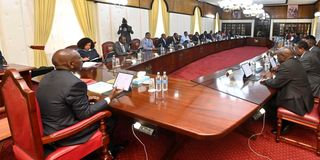Premium
Cabinet okays special team to audit Sh641bn pending bills

President William Ruto and Cabinet Sectaries during a past Cabinet meeting at State House, Nairobi.
The Cabinet has approved the establishment of a special committee to probe the authenticity of pending bills amounting to Sh640.9 billion owed to suppliers by the national government and counties.
In a meeting chaired by President William Ruto on Tuesday, the Cabinet okayed the creation of the Pending Bills Verification Committee which will be tasked with the auditing of liabilities for the period between 2005 and 2022.
Official figures indicate that the national government owes some Sh481 billion to suppliers while the 47 counties owe Sh159.9 billion in what has become a sticky issue for the Kenya Kwanza administration.
The Committee will consist the Attorney-General, the State Department of Roads, the State Department of Public Works, the State Department of Housing and Urban Development and the Public Procurement Regulatory Authority (PPRA).
It will also consist of the Ethics and Anti-Corruption Commission (EACC), the Law Society of Kenya (LSK), the Institute of Engineers of Kenya (IEK) and the Institute of Certified Public Accountants of Kenya (ICPAK).
The Committee will examine and submit interim reports to National Treasury Cabinet Secretary Prof Njuguna Ndung’u upon verification after which the government has promised to honor the verified pending bills.
“The move is aimed at establishing the integrity of all bills and cushioning small enterprises against liquidity inadequacies. Crucially, the committee will propose a mechanism to stop future pending bills,” said a Cabinet dispatch.
“It was agreed that the Committee will present its final report within a year,” it added.
Pending bills have been a major headache for thousands of suppliers of goods and services to the government leading many of them to default on their bank loans while others have been auctioned.
About 80 per cent of the national government’s ending bills are owed by cash-strapped State-owned enterprises with the remaining portion owed by ministries and departments.
The World Bank recently warned that pending bills are pushing thousands of businesses to default on their loans.
Fresh data from the Central Bank of Kenya (CBK) shows bad loans in the banking sector has risen by 18.23 per cent in the 12 months to April to hit a record Sh570.6 billion up from Sh482.6 billion.
“Pending bills in Kenya and non-performing loans have been trending in the same direction for the last two years,” said the World Bank in its latest Kenya Economic Update report.
Kenya Kwanza had in its manifesto ahead of last year’s polls pledged to securitise pending bills, a move that would see the government float a bond to retire the arrears that have inflicted grave cash flow constraints on businesses across the country.
The government however shelved the plan following concerns it would significantly increase the pile of debt which hit Sh9.39 trillion in March, at a time the country’s position has been classified as being at high risk of debt distress.
“Management of pending bills is a challenge. The delay in settling payments of pending bills has led to the deterioration of the financial position of businesses, in particular micro, small and medium-sized businesses," Prof Ndung’u recently told the National Assembly.
At the same time, the Cabinet approved the establishment of decentralised offices of the Attorney-General and the Department of Justice.
“This will ensure that services are accessible to the people at the grassroots at a minimal cost,” said the statement.
It also consented to the transmission and introduction of Tribunals Bill, 2023, to Parliament.
If enacted, the Bill will rationalise and regulate the administration and functions of Tribunals, establish the Tribunals Registry and ensure independence and impartiality in their operations.
The Cabinet also confirmed the hosting of the Bill and Melinda Gates Foundation in Kenya, stating that the decision was informed by “importance of working with the private sector in the areas of Universal Healthcare”.
The Cabinet was also apprised on the status of the Digital Superhighway and digitalization of Government services ahead of the launch of over 5000 fully digitized services on Friday June 30th.
Further, President Ruto cleared the Advisor on Women Rights Harriette Chiggai to be attending the meeting.
He also cleared Advisors Monica Juma (National Security Advisor), David Ndii (chairperson of Council of Economic Advisors) and UDA Secretary-General Cleophas Malala to attend the Cabinet sittings.




